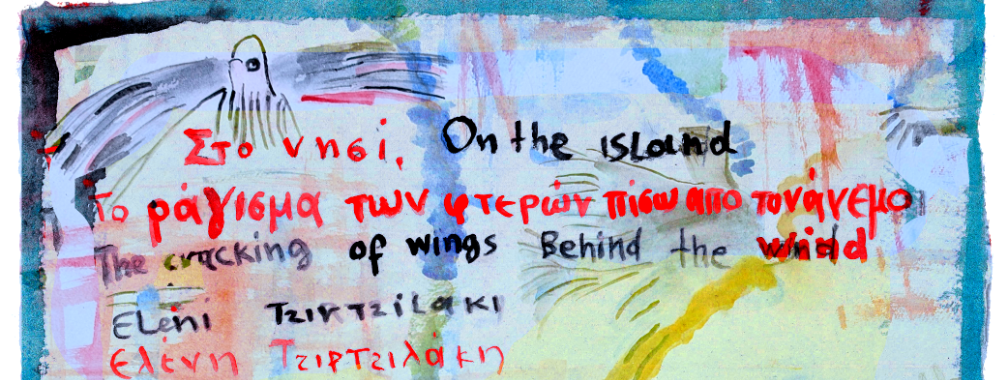Eleni Tzirtzilaki | Exhibition at the Old School of Kastro, Sifnos
12 – 17 July 2025
Red is the color of despair. So Eleni Tzirtzilakis’ paintings tell us, and we should believe them, as they come from a deep fond, both dreamy and nightmarish, coming from the bowels of the psyche, of earthy psyche, of psychic earth. They talk to the words, they gesture to sea, boats, animals, suggest elongated vampiric images, ghoulish forms stretched like rubber that find no respite in the words. The landscape is a constant unrest, a stormy sea, a bloodscape, a fractured, fantasmatic, female, exhausting womanscape. The colors seep into the paper, setting and upsetting the body, become blots of gardens, fields, birds of prey. Cormorants and sly seagulls, poised and aggressive, bury themselves in the pelvis, dig deeply into the womb, pull the flesh, pull away the memory of the body, exile it.
There is a constant, draining expectation percolating from the bodies, these chimeric naked bodies, half woman half animal. Maybe a donkey, the animal of patience? Maybe a dog, the animal of devoted obedience? Both of them frequently wounded, always patient animals, animals of companionship. Haunting. They chase after the gaze like ghosts, they live in ponds of blood, cry out to the blood, as do the poppies, and the roosters, and the cats who are always there, present, at the site of an erotic stroke. Humans, and animals, and birds, and flowers, all together. Women, maybe children, too, maybe men, also, se touchent, they touch each other, kiss, smell each other, caress each other, with no melodrama, no nostalgia, no compass other than the rare, miniscule narratives strewn here and there on some paintings.
They bring to mind Anna Kindyni’s latter-day “Έρωτες.” Angelic women, some naked, others draped in gossamer, painted in crushed and muted reds, all of them standing, all of them in motion, their eyes turned to flight. And they also bring to mind the hungry children of Käthe Kollwitz, pulling on their mother’s apron in Interwar famished Germany, sketched in charcoal that now, looking at them through Eleni’s red despair, I wonder if, maybe, if they weren’t drawn in charcoal, would they be red? Eleni Tzirtzilaki shows us how despair can be strawberry red, can be surrounded by flowers, by the sea, by cats, by a kiss, and despite all that softness still and again throw us to the depths of desperation. Her bodies are often sitting or reclining, as if taunting or purposefully ignoring an apparent and imminently oncoming act that could be violence, or delight, or maybe even pleasure. And they stick their tongue out at it.
Is it a sob? A silent cry? A kiss? A kiss of recognition? Of passion? Of painful separation? What are those breasts, the genitalia, the skeletal and disincarnated extremities, the birds with the massive beaks and the red poppies and the purple wild peas? We don’t know. Nothing tells us. But whatever they might be and whatever it is that we are seeing now for the first time, will forever forth be living in our frontal lobe, will remain nearly seared on our retina, a daimonion sitting on our shoulder, keeping us in a constant state of alert.
Neni Panourgiá, Leros, 5 July, 2025
Neni Panourgiá was born in Athens. She is an anthropologist, Associate Professor and Academic Adviser at the Justice-in-Education Initiative, Columbia University in New York.

